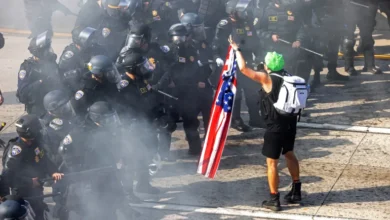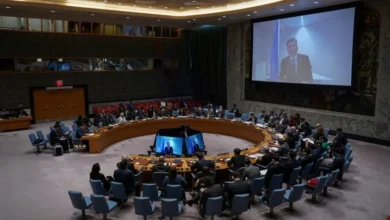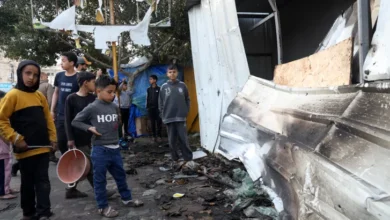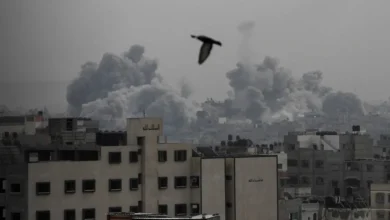Gambia parents ‘fight for children’ in landmark trial on India syrup deaths
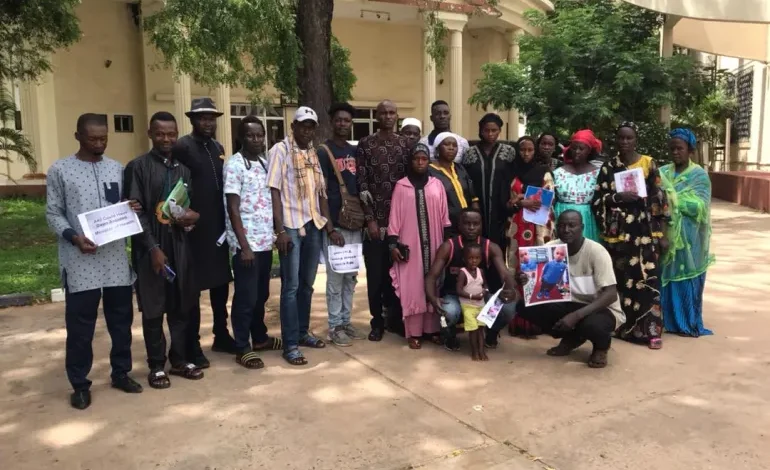
It’s the happy memories of his toddler son playing around their home in The Gambia’s capital that are most painful for Ebrima Sagnia to remember. When he tries to speak, Sagnia pauses mid-sentence, muted by grief.
In September last year, Sagnia watched Lamin writhe in pain on a hospital bed. The four-year-old had developed a fever early that month, which was common in the rainy season. His parents had given him prescribed medication, hoping the high temperature would go away, but Lamin developed new symptoms instead, becoming drowsy and unable to pass urine for days. He was rushed to the hospital, but his symptoms persisted. Despite his discomfort, Lamin just wanted to return to their home in Banjul and play. He loved football and motorcars. When his dad drove, Lamin would sit in his lap and pretend he was the driver.
By mid-September, about a week after his parents took him to the hospital, Lamin had died. Doctors told Sagnia the cause was complications from acute kidney injury (AKI). The condition, a sudden onset of kidney failure, causes swollen limbs, nausea, confusion and reduced urine flow.
Lamin was one of 70 children killed last year by substandard cough syrups imported from India that the World Health Organization (WHO) said contained “unacceptable levels” of toxins. Most of the children were under five, and some were from the same family. The case has underlined the difficulties low-income economies like The Gambia face in sourcing quality medication and implementing local quality controls.
“Every day reminds me of my son, how he kept saying to me, ‘Daddy, take me home. Take me home,’ and I told him I would,” Sagnia said.
Sagnia could not take his son home, but the 44-year-old is now leading a coalition of 19 aggrieved parents who’ve dragged their government and private entities involved in producing and distributing the medicine in The Gambia to court. The parents, Sagnia said, are seeking justice and restitution for what they say were deaths caused by “negligence and breach of statutory duty”. The Gambia’s Ministries of Health and Justice, the drug manufacturer and distributors, and the country’s Medicines Control Agency (MCA) are all listed as defendants.
Court hearings began on July 21. At the second sitting on October 24, none of the government’s representatives showed up, Loubna Farage, a lawyer representing the parents, said, and the court fined them. About nine of the parents chosen to represent the group were present along with their family members who had shown up for support. The group filled the courtroom, their faces long, their demeanor heavy.
At another court hearing on November 7, government lawyers showed up, but representatives of the manufacturer and distributor were missing. The judge was forced to adjourn until late in November.
Deadly doses
The cough syrups in question are four brands, all manufactured by Maiden Pharmaceuticals Ltd, an Indian drugmaker, and imported by The Gambia-based Atlantic Pharmaceuticals Co. On their colourful packaging, the syrups carried a logo saying they were WHO-certified. Officials of the WHO told Al Jazeera the claim was a lie.All four medicines contained high levels of diethylene glycol (DEG) and ethylene glycol (EG), officials at the WHO and the United States Centers for Disease Control and Prevention (CDC) confirmed. Both are sweet-tasting but deadly substances normally used to manufacture products like brake fluid and windshield wipers.
Mass poisonings like this have more recently been recorded in India, Panama and Nigeria. Several cases in the past document how manufacturers intentionally swap out pharmaceutical-grade propylene glycol (PG), a mildly sweet additive used to improve the solubility of medicines for the similar, much cheaper and fatal DEG and EG.
In a January alert, the WHO said it had recorded 300 child fatalities in 2022 across seven countries, including Indonesia and Uzbekistan, due to contaminated medication. Six deaths have also been recorded in Cameroon this year. It’s the deadliest set of poisonings recorded since 1996.
An Indonesian firm, Afi Farma, manufactured the syrups locally in that country’s case while China’s Fraken Group produced the syrups pulled off shelves in Cameroon. In August, Uzbek authorities began the trials of officials of Marion Biotech, another Indian manufacturer, for reportedly selling contaminated cough syrups believed to have killed 65 children in the Central Asian country.
Health experts are not sure how the poisonings are occurring but believe substances or additives like PG
In The Gambia case, Indian health authorities said the WHO failed to show a direct link between Maiden’s cough syrups and the multiple deaths and accused the UN agency of trying to tarnish the country’s image. Tests by Indian health authorities, the Indian government said, did not reveal contaminants in Maiden’s products. Maiden has also said it did nothing wrong.
But Parsa Bastani, a CDC epidemiologist who led an expert team to assist The Gambia in its investigation, told Al Jazeera the tests conducted left no doubt as to what caused the clusters of AKI deaths.
“I don’t know what evidence the Indian government was reviewing,” Barstani said, “but the evidence we found highly suggested that there was a link.” His team had received a request to investigate from Banjul in late August last year and arrived in The Gambia just as the deaths peaked in mid-September.
“The drug testing showed there were levels of DEG in all the cases and that that led to the deaths,” Bastani said, clarifying that his team had not done a separate test but had analyzed tests done by WHO officials also on ground at the time. “That was a very difficult and sad process to be there and collect information from parents, some of whom had lost their kids within the past week.”
used to stabilise the medications are likely contaminated. WHO officials said they have no evidence the cases are linked.
Industry malpractice?
Gambian authorities have flown into a flurry of activity since the tragedy.
In October last year, three months after they started investigating the unusual spike in AKI deaths among children, the country banned Maiden and Atlantic. In June, officials went further, tightening import controls from India. All drug exporters from that country must now present clearance certificates from a designated Indian testing laboratory.
Authorities also fired the head and deputy of the MCA, the entity in charge of certifying and monitoring imported pharmaceuticals, which should have stopped the drugs from going on the market. Children died in six of the country’s seven regions, underlining the spread of the contaminated medicine.
Banjul is also mulling legal action against Maiden and possibly the Indian government, the Reuters news agency reported.
Analysts have also pointed out “unacceptable” lapses in the Ministry of Health itself that might have contributed to the steepness of the death toll.
Although health workers at the Edwards Francis Small Teaching Hospital alerted the ministry about an unusual cluster of deaths in late July 2022, the first public warning to stop selling or using a list of suspected cough syrups did not materialise until September, more than 40 days later.
A review of the timeline of events as well as information from the CDC team and government reports show that the contaminated medicines were imported about June 21 and that AKI deaths peaked in mid-September before tapering off in October.
But there were already suspicions as early as August that the syrups were poisoned.
One parent whose child used the syrup in July and died on August 5 said doctors in Banjul asked him what type of drugs he used and that he had presented the syrup. “One of the doctors told me that they were having these cases and that my son was the fifth case,” Alieu Kijera, an eye nurse, said. Kijera said he was surprised when he continued to hear of many cases after his son, two-year-old Mohamed, died and was shocked to know the medication was still available on shelves in The Gambia at the end of August.
Some children, including Sagnia’s son, used the deadly drugs weeks after the authorities had been officially alerted.
“It’s unacceptable that after having some evidence, even if not confirmed, that the authorities there let it pass for another month,” said Prashant Yadav, a health supply chains scholar and Harvard Medical School lecturer, who has researched pharmaceuticals in Africa for more than a decade.
“Even if it was a wrong call, what would we have lost by preventively taking a product off the market? Safety comes so much higher than anything else,” Yadav said.
The Gambian Health Ministry and the MCA did not respond to Al Jazeera’s requests for comment. In a report by a government task force looking into the deaths, authorities said they “suspected that the AKI could be caused by drug toxicity” after the initial alert in July and that the Health Ministry “decided to ban these drugs even before receiving confirmation from the laboratory testing”.
Hiring people with vested interests in The Gambia’s pharmacy sector may have also contributed to the deadly medicines going on shelves across the country.
While fully employed elsewhere, Gambian pharmacists commonly double as supervisors in private dispensaries, local sources as well as the government task force report confirmed. The practice, referred to in local media as tantamount to “renting out licenses”, presents a potential case of conflict of interests, according to the government report.
